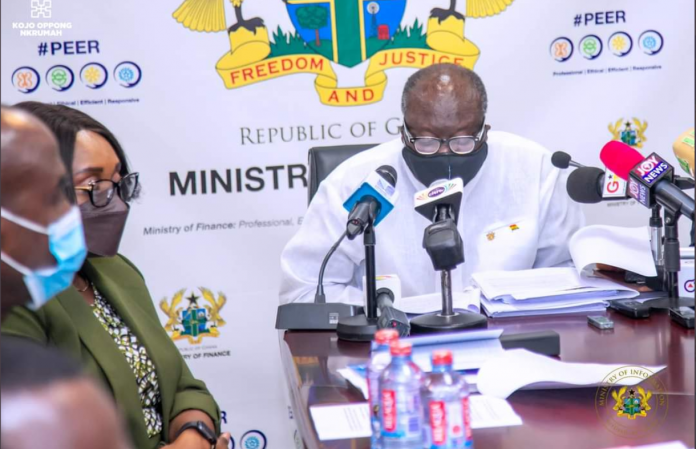[ad_1]

Finance Minister Ken Ofori Atta has said while answering a question at a press conference in Accra on Wednesday January 19 on what the government’s Plan B is for the economy and revenue generation, that the plan is for the government to remain focused and get the E-levy proposal through to ensure the domestic revenue mobilisation is strong.
He told the pressmen that there cannot be absolute agreement on government’s policies.
“There is no way we can have absolute agreement.
“We are going up by 40 per cent with regards to revenue mobilization and then expenditure is also going up by 25 per cent. We have always been very good about being able to to cut down on expenditure appropriately when we don’t meet our target.
“With this new dawn of GRA exceeding targets, we expect that to continue. With the new national ID system we are now 15.5 million people are going to be on their books.
“That is what gives me the excitement into the future because when I read the Fitch Report, you are doubting that we can make our revenues , I am confident that we can. They are worried that we cant come to the international market , we are saying its fine, we have our SDRs that will suffice for the first half and then we will figure out another method of getting the
“So plan B is to stay focused and ensure that we get our E-levy through , ensure that our domestic revenue mobilization is string and that be, we do not need to go the market.”
The E-levy proposal in the 2022 budget statement has sharply divided parliament. The opposition MPs have rejected the proposal.
The Minority Leader Haruna Iddrisu said the policy proposal is a disincentive to the growth of digital economy.
To that end, he said, the Minority would not support it.
Speaking at a post budget workshop in Ho on Saturday November 20, he said “Mr Speaker, understandably, we see that the Minister of Finance seeks to introduce some measures including the now popularly declared e-levy or digital levy as some have quite named it.
“Mr Speaker, our concern is whether the e-levy itself is not and will not be a disincentive to the growth of digital economy in our country . We are convinced that the e-levy may as well even be a disincentive to investment and a disincentive to private sector development in our country. We in the minority may not and will not support government with the introduction of that particular e-levy . We are unable to build national consensus on that particular matter.”
Finance Minister Ken Ofori-Atta announced this levy to be charged by government in 2022 on all electronic transactions to widen the tax net and rope in the informal sector.
“It is becoming clear there exists enormous potential to increase tax revenues by bringing into the tax bracket, transactions that could be best defined as being undertaken in the ‘informal economy’,” Mr Ofori-Atta observed on Wednesday, November 17 as he presented the 2022 budget statement in Parliament.
“After considerable deliberations, government has decided to place a levy on all electronic transactions to widen the tax net and rope in the informal sector. This shall be known as the ‘Electronic Transaction Levy or E-Levy’.”
He explained that the new E-levy will be a 1.75 per cent charge on all electronic transactions covering mobile money payments, bank transfers, merchant payments and inward remittances to be borne by the sender except inward remittances, which will be borne by the recipient.
This will, however, not affect transactions that add up to GH¢100 pr less per day.
“A portion of the proceeds from the E-Levy will be used to support entrepreneurship, youth employment, cyber security, digital and road infrastructure among others.”
This new levy is scheduled to start Saturday, January 1, 2022.
In 2020, total value of transactions was estimated to be over GH¢500 million with mobile money subscribers and users growing by 16 percent in 2019.
According to a Bank of Ghana report, Ghana saw an increase of over 120 percent in the value of digital transactions between February 2020 and February 2021 compared to 44 percent for the period February 2019 to February 2020 due to the convenience they offer.
This was definitely heightened by the advent of Covid-19 especially during the lockdown.
By Laud Nartey|3news.com|Ghana
[ad_2]



















